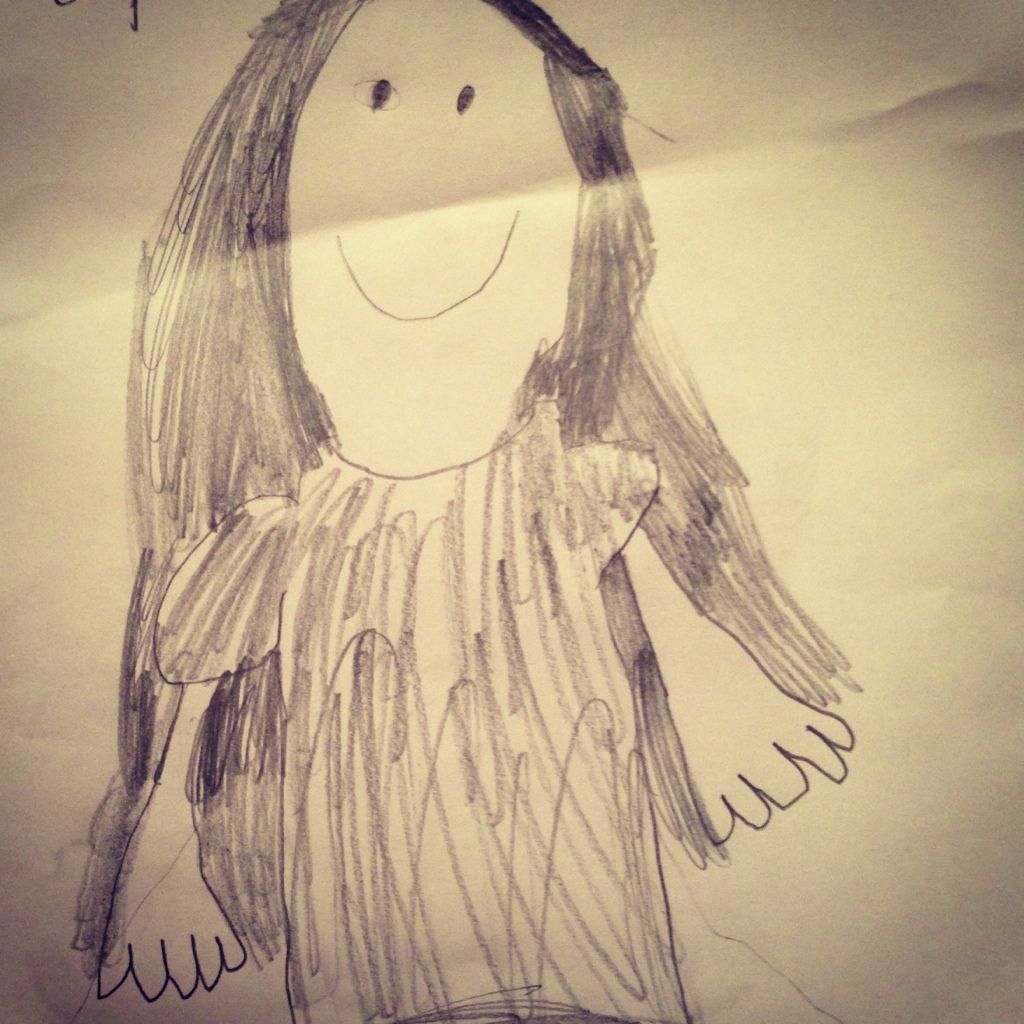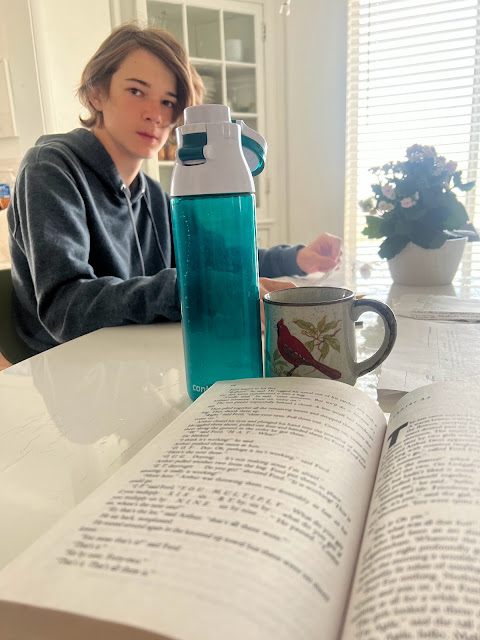Our Village

I had not prepared myself for an intense situation. Had I known what was being asked of me, I might have turned down the invitation. I didn't want to be here, not here, hyperventilating in the backseat of a Ford Explorer as we rolled down miles of frozen highway headed west.
My heart. My heart. My heart was punching my chest like a prize fighter in a live televised duel. Punching, and beating, left and right, hooks and jabs, uppercuts. My heart didn't want to feel the present, it wanted out of my body. I wanted out of my body. At the next stop light, surrounded by smoky exhaust and lights blurred by dewy fog, unaided by the defroster, I closed my eyes and imagined jumping out of the car and running east.
"God loves these girls. God loves these girls. God loves these girls."
Repeated, over and over and over in my head. A mantra I tried to pair with a vision. God in splendid whiteness, glowing, hovering over five small girls, kissing them, touching their faces. God smiling. And reassuring. And holding them, all together, close.
A Target store, a mall, miles of empty space frosted by crusted snow, a temple, warehouses, west, west.
"God loves these girls. God loves these girls. God loves . . ."
The man driving the car, Eric, was a stranger to me. His words were projected loudly from his mouth to the back of the car. They bounced off Chup sitting in the front seat, silent. They rattled against me and my friend Leah next to me, and floated behind us to her husband Geoff.
His voiced cracked.
"These girls are train wrecks," and then he stopped talking for a second to gain composure. "Their abuse was so horrifying they can't function in foster care. They can't function in a school setting. Their behavior is too difficult. They are the children nobody wants."
And after that, the stories. Stories of mothers neglecting their babies in cribs for days. Babies malnourished from no emotional connection. Little girls abused by the men who are meant to protect them. Girls who only know a world of cops, anger, psychiatric hospitals, isolation, pain, distrust, anxiety, depression, damaged hope.
"Are you ok?" Leah said to me, as the shadows and sun shifted back and forth on her beautiful face and blond hair.
This is what motherhood has done to me: made me highly sensitive to emotional torture. These stories only made me think of my own babies, imagining them in their crib, crying for days, wet, soiled, matted hair, crusted face with remnants of an unstoppable nose. Crying for me. For me. Crying and stopping and crying. And wondering where I am. And I can't.
I can't go there.
Because when I do, you might as well pour hot coals on my naked skin. Hold me under water until I scream for breath. Thoughts of my children and their faces hurt, alone, abused, attacked, make my own physical torture pale in comparison. Sitting in that car, hearing the stories of five young girls--from eight to thirteen--unable to thrive because their mothers or their fathers hurt them was too much for me to take. It was an avalanche of pain and my heart was digging and digging to get out.
"God loves these girls. He knows them. He wants to help them."
I was beginning to sweat in my silky black dress. Eric had sent us an email earlier in the week after we set up a date and time to visit the girls asking us to dress up a bit for the evening. The girls and their care givers wanted to make us dinner. "Your visit is a big deal to them," he said. Our invitation was initiated by Geoff who had been asked to do some pro bono work for the agency, Youth Village. I was asked to come for this purpose: to write about it.
But I didn't know if I would even make it to the home. And when we pulled up and parked in front of the home, cream siding and embedded in suburbia, I had to silently repeat more affirmations, conjure up more courage. I was afraid of one thing, that I would see my children in their faces. These girls, I were afraid, were my own. That's another thing motherhood has done to me: adapted a feeling of universal motherhood, all children have a place in my heart.
Even the ones who hurt beyond connection.
The front door was opened by a little girl in a pink taffeta party dress, dark wavy hair, nervous eyes. She politely introduced herself, and we were ushered into a front room packed with four other girls in party dresses (simple dresses) a therapist, a volunteer and a young twentyish couple with a three-month old baby boy who were called "Family Teachers". There were formal introductions, each girl came through a line like a wedding reception, offering their hand and looking at us shyly, but directly, in the eyes.
In a hushed tone the therapist and mother complimented each girl on their introductions and marked observations down on clipboards. The girls were nervous. We were nervous. There was a dry awkwardness that existed between all of us. The girls were incredibly polite. Their manners and social cues were light years beyond what I had seen of girls their age. This is not what I had expected.
It was explained to us that the goal of Youth Village was to take in the girls who could not function in foster care or in a public school setting and teach them skills to be prepared for both circumstances. The main component of this teaching was setting up boundaries for the girls. These boundaries ranged from physical to mental. For instance, they are not allowed each other's bedrooms. They are taught how to hear the word "no" and accept it gracefully. They were praised for accepting compliments. They were given high points for getting a task, doing it cheerfully and reporting back.
Boundaries.
For months I've been setting up boundaries in my own life. Setting up boundaries have become a holy and hard work for me. I imagine my life from the view of a corn maze. All the dead ends are blockaded by boundaries, meant to protect whatever was on the other side--my sanity, I suppose. Boundaries for me started with my children--teaching them what was acceptable and what wasn't. Angry hurting or yelling at me was not acceptable, neither was stealing sips from my water bottle (I shared my body with them, but not my water, so help me). I also set up boundaries with Chup, my family, my friends and myself. Boundaries did the very opposite of its root word, they didn't bind me, they made me free.
These girls were being set free.
Dinner was served. We ate fish and fruit, rice and drank from pitchers of something pink. Lemonade? After dinner the girls entertained us with artwork, stories and conversation about five bright futures. There were moments of frustration from the girls. There were moments of light hearts. Each moment brought immediate reaction from the young couple or the therapist to the girls. "This was good" or "this needs help" ever-present conversations of evaluation. I noticed the mother asking repeatedly after explaining her feedback, "Does that make sense?" And the girls would gratefully nod and try again.
We read a book one girl had written while in the hospital (the children's psychiatric ward) about princess (and unicorns) who had to battle darkness in order to find her fairytale.Another girl showed us photographs of a hopeful family in the east who wanted to adopt her and her younger siblings who live in foster care. One girl disappeared for a bit and came back with a pencil sketched picture of me with long locks. She told us she was from Provo too, born here, "with my good mom Jackie."
And the girls, all five of them were mine. From the ten year old with the freckles and the thirteen year old with the sweet tooth, I thought about asking if I could take them all home. They were lovable and careful. They were nervous and shaky. But hopeful. It was easy to trace the hurt and abuse in their countenances, it was easy to see their disconnect, but it was also easy to feel the hope springing up in them.
Leah and I were asked to tell the girls about our lives. Leah talked about becoming an artist and mother and the girls clapped. When it was my turn I wondered what I should share and just as I opened my mouth I heard myself talk about hope--about overcoming abuse and trial, disappointment and shame. I told the girls I had learned something big in my life: hope is a choice we get to make.
The girl with the freckles growled at me when I talked about having babies. I will never forget that. I don't know why she growled but a million reasons flashed through my mind. I wondered if I had triggered something about her own mother? Or was it body-oriented? Immediately I felt concerned I had said something that was too personal. But the moment was quickly soaked up by the mother giving feedback to the girl with freckles and her growling, in a private setting.
At the beginning of the night they shook our hands hello, but by the end we all hugged good bye. When we returned to the Ford Explorer my heart had significantly calmed down. I could see that in many ways their lives of hard work in a place far, far away from entitlement were preparing them for a future of bravery and deliberateness. Boundaries would keep them safe and looking people in the eye would teach them how to read a soul. I hoped.
When we arrived back at our rendezvous spot, in the recesses of a large parking lot, the night was dark and cold. We said our good-byes to Eric and thanked him for the honorable opportunity. Back in Geoff's truck we debriefed on our individual experiences. Chup, who had stayed silent for most of the evening until I outed him as an actor (the girls go crazy! An actor! A real actor in our house!) said his genuine reaction to seeing each girl was coupled with a desire to hurt back those who had hurt them (most are serving time in prison). Geoff and Leah talked about how the experience inspired them to change some things about the way they parent their three children.
I don't know what I think other than I can't stop thinking about it. I can't stop thinking about these girls and their futures. I think about how in some ways they are better off than those of us born into better homes--their emotional and physical survival skills are being learned at a younger age. I find myself thinking about utilizing boundaries when I was ten and I think of how different my life would've been. I think about them learning to understand forgiveness intimately from the very beginnings of their lives. I think about all the opportunities that will come their way because they can accept life, hard and easy, disappointing and thriving, in all its shades of light. And I guess this is the answer to my repeated prayer muttered over and over again in that Ford Explorer headed west: God does love these girls.
And that's how I know it.
Happy Martin Luther King, Jr. Day! May we all have a dream and may it come to fruition.

